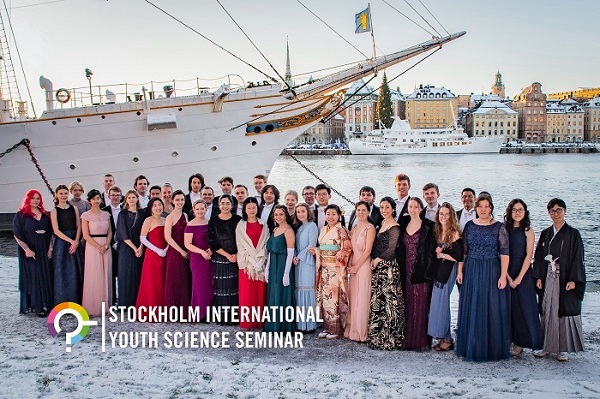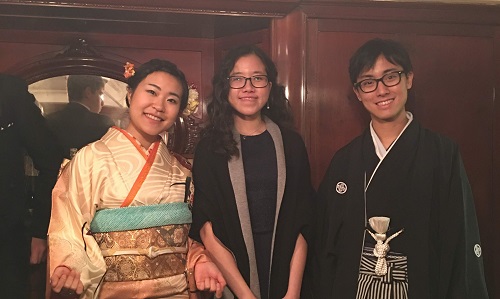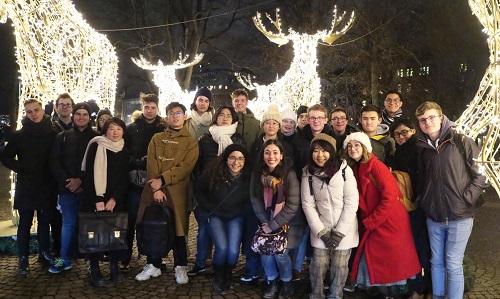Email: koho*office.hiroshima-u.ac.jp (Please replace * with @)
Taiyo Ishikawa from HU’s Graduate School for International Development and Cooperation (2nd-year master’s student), participated in the Stockholm International Youth Science Seminar held in Sweden in December 2019, as a representative of Japan, selected by the Japan Prize Foundation. We interviewed Mr. Ishikawa about the activities conducted during the seminar, and what he had learned through attending this event.
What activities did you take part in during the Stockholm International Youth Science Seminar?
Along with the award ceremony, the dinner party, the award lecture, and other events related to the Nobel Prize, I also attended an ethics seminar and presented my research to the local high school students. Additionally, there were Christmas lunch and international exchange banquets, where I had the chance to socialize and interact with other seminar participants.
What was the most memorable activity for you during the seminar?
I had the chance to meet and talk to many Nobel Laureates at the Nobel reception, including Professor Akira Yoshino from Meijo University, who had been recently awarded the Nobel Prize in Chemistry. Professor Yoshino, in particular, spent a very long time giving me advice on my future research.
One of the motives I had when I applied to participate in this seminar was to deepen my knowledge about the usage of science technologies in the real world. Hence, it was a valuable experience to have had the opportunity to ask directly to Professor Yoshino regarding what he focuses on when researching about basic science and societal implementation. He told me that it is essential to capture the entire picture of the society and understand where your research stands, increasing the precision and accuracy by going back and forth between the ideas of basic science and the actual societal implementation of technology.
In the future, I am planning to work on improving the social problems associated with transport infrastructure, by understanding the big picture of the society and the research fields following the advice of Professor Yoshino. I strongly felt that I need to challenge myself in many things while thinking about what I can do to make the world a better place.
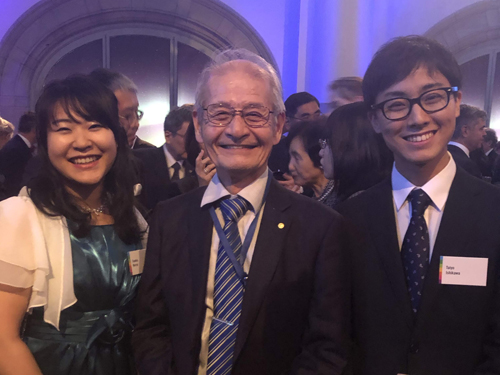
Commemorative photo with Nobel laureate Yoshino
You had to interact with other researchers and do a presentation in English. How would you describe that experience?
I was able to actively communicate with many participants who had gathered from around the world. However, during a debate session about the use of genetic modification technology, there were several occasions when I felt that my English abilities and activeness were lacking. I was overwhelmed by how the other participants were basing their arguments on their opponents’ comments, processing the information instantaneously, and speaking logically; their aggressiveness, influential voices, and their reasoning ability were simply amazing. From now on, to live in an increasingly globalized society, I would like to focus on being able to understand and process the opinions of others spontaneously, as well as being able to communicate my ideas precisely using English when I work on daily research.
Was there anything you struggled with when you took part in the seminar?
Preparing the research presentation for the local high school students was difficult. Before traveling to Sweden, students from different majors helped me practice my research presentation, as they listened to my speech. However, I realized that the concept I wanted to convey was much more difficult to understand for the audience than what I had expected. This is because students from other majors may not recognize and understand the prerequisite knowledge which is ordinary for the experts within my research field and office. Therefore, I took extra care when I prepared my presentation, using concepts and expressions that are easier to understand. Even on the day of the actual presentation in Sweden, I repeatedly discussed with the high school students about what kind of explanation would be suitable to make my presentation clearer. As a result, many of the students were able to understand the concept and knowledge which I wanted to convey, and I was able to have a meaningful discussion with them.
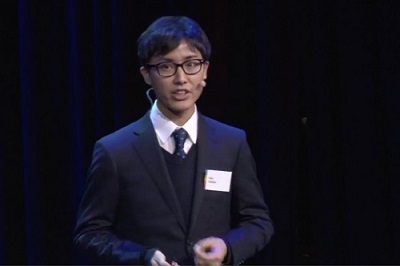
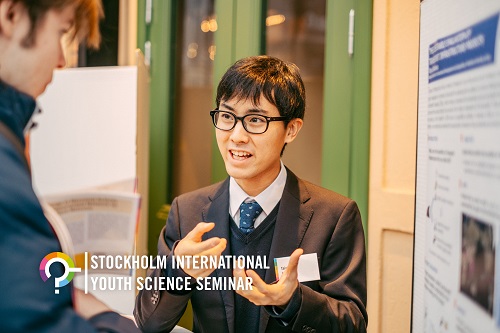
Please tell us what you have felt and gained through attending the seminar.
Through the interaction with young researchers from around the world, I felt that science has the power to connect the world. In this seminar, there were participants from 19 different countries, within a broad age group (varying from those students who have just graduated high school to those who are doctoral students) and with each individual majoring in different topics. Even in this versatile situation, what was common to each individual was that they love science, have pride in their research field and have confidence when presenting their research. Because we had something in common, we were able to discuss each other’s research and spend meaningful time together.
As I struggled to convey my research to high school students, I feel that the awareness I had when conveying the information to the audience has grown significantly. For example, I came to realize that I need to think about who the audience is, and what is the most essential piece of information that I want to convey, by planning the flow of the explanation, using clear expressions and choosing appropriate vocabulary, making my explanation easier to understand. I believe that this valuable experience can be used in many aspects of life, and is not limited to research presentations.
Public Relations Group
Hiroshima University

 Home
Home